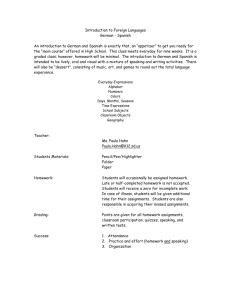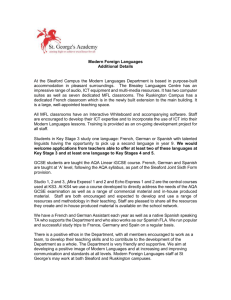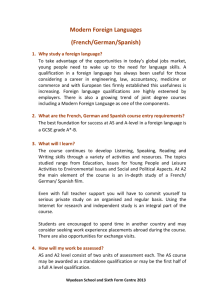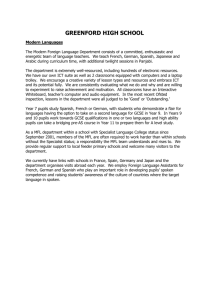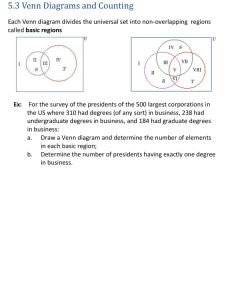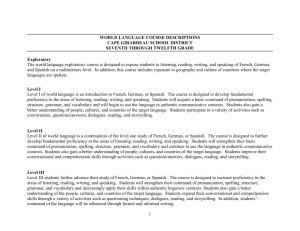Modern Foreign Languages
advertisement
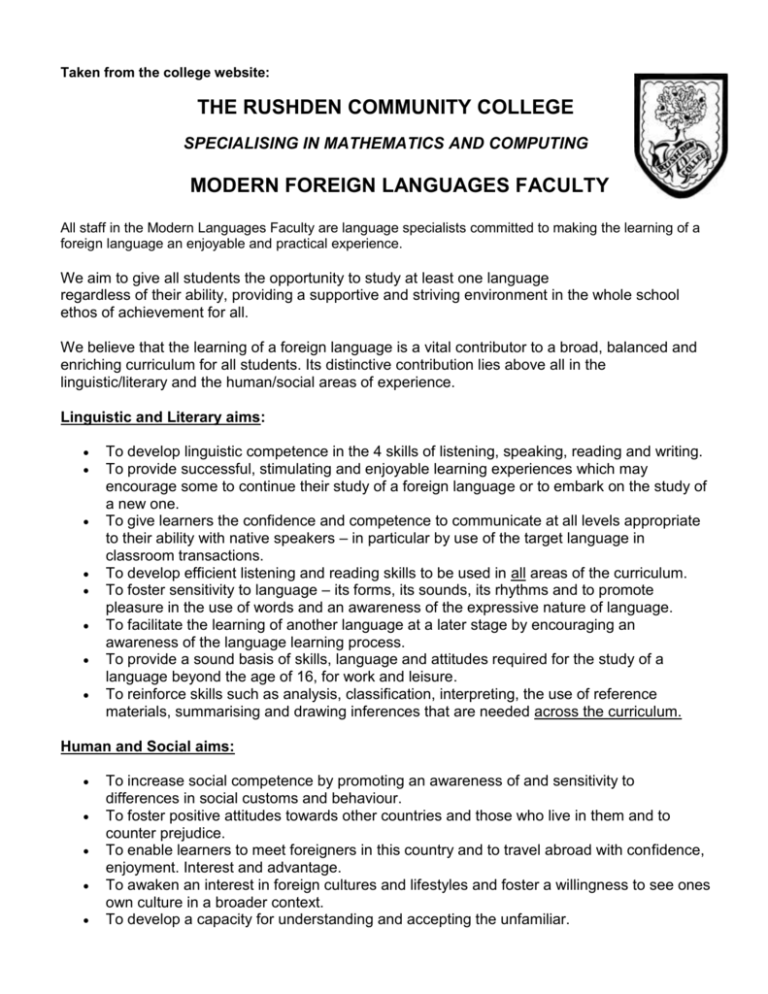
Taken from the college website: THE RUSHDEN COMMUNITY COLLEGE SPECIALISING IN MATHEMATICS AND COMPUTING MODERN FOREIGN LANGUAGES FACULTY All staff in the Modern Languages Faculty are language specialists committed to making the learning of a foreign language an enjoyable and practical experience. We aim to give all students the opportunity to study at least one language regardless of their ability, providing a supportive and striving environment in the whole school ethos of achievement for all. We believe that the learning of a foreign language is a vital contributor to a broad, balanced and enriching curriculum for all students. Its distinctive contribution lies above all in the linguistic/literary and the human/social areas of experience. Linguistic and Literary aims: To develop linguistic competence in the 4 skills of listening, speaking, reading and writing. To provide successful, stimulating and enjoyable learning experiences which may encourage some to continue their study of a foreign language or to embark on the study of a new one. To give learners the confidence and competence to communicate at all levels appropriate to their ability with native speakers – in particular by use of the target language in classroom transactions. To develop efficient listening and reading skills to be used in all areas of the curriculum. To foster sensitivity to language – its forms, its sounds, its rhythms and to promote pleasure in the use of words and an awareness of the expressive nature of language. To facilitate the learning of another language at a later stage by encouraging an awareness of the language learning process. To provide a sound basis of skills, language and attitudes required for the study of a language beyond the age of 16, for work and leisure. To reinforce skills such as analysis, classification, interpreting, the use of reference materials, summarising and drawing inferences that are needed across the curriculum. Human and Social aims: To increase social competence by promoting an awareness of and sensitivity to differences in social customs and behaviour. To foster positive attitudes towards other countries and those who live in them and to counter prejudice. To enable learners to meet foreigners in this country and to travel abroad with confidence, enjoyment. Interest and advantage. To awaken an interest in foreign cultures and lifestyles and foster a willingness to see ones own culture in a broader context. To develop a capacity for understanding and accepting the unfamiliar. To encourage tolerance and a willingness to work together in pairs and groups. To encourage respect for others and the working environment. To acknowledge the importance of every individual and to allow each learner to reach their full potential. To provide challenges which will motivate both teacher and student. To encourage students to take pride in their work and to reward both effort and attainment. To promote independence in language learning and use. We present these aims in such a way that learners understand them, see them as relevant and wish to achieve them. Literacy within the Faculty. We recognize the importance of supporting the college priority to develop students literacy across the curriculum and do this in the following ways: We focus attention on spelling and word patterns. We display commonly used words around the classroom. We promote an awareness of grammar – students understand the role of nouns, adjectives, verbs, adverbs, prepositions etc and understand the concept of tenses. We teach students how to use a dictionary correctly and how it can support their learning. We test spelling regularly. We develop reading skills by encouraging students to pick out cognates, and deduce and anticipate meaning from context. We encourage reading for pleasure – Mary Glasgow magazines. We teach students how to improve their written work by modelling/group writing. We encourage students to draft and redraft their work to improve it. We emphasise the need to maintain an excellent standard of presentation of work. Numeracy within the Faculty. We recognize the importance of supporting and reinforcing numeracy within our subject area and are committed to this in the following ways: Our SOW hilight opportunities to reinforce basic number work, number patterns and data handling One member of our team has been appointed numeracy link and attends meetings with the numeracy coordinator. We have compiled a booklet of number games to be used across the Faculty. It includes a section devoted to brain teasers to be used as lesson starters/ homework. Numbers are displayed in every language classroom to facilitate learning and teachers will continue to use numbers and number patterns in class routines such as register taking and mark collecting. Cross curricular projects have been established with the Maths Faculty at KS3, making use of the e mail link we have set up with a French school. Surveys become more relevant and authentic, as real statistics are exchanged between countries in language lessons and the findings are then shown on graphs in maths lessons. ICT within the Faculty. We are committed to reinforcing the importance and relevance of ICT across the curriculum. In the Faculty students make full use of ICT to: Improve the presentation of work – at KS4 students can word process their coursework. Produce authentic posters and brochures using various programmes. To produce Powerpoint presentations as a motivating alternative to written work or as an aid to a speaking presentation. Research a cultural aspect of their studies/download authentic target language documents particularly at KS5 for the speaking exams. Send to and receive e mails from our link school. Play language learning games using independent learning software packages such as Metro Electro and Eurotalk. The recent addition of interactive whiteboards to the faculty has greatly enhanced student motivation and will play an important part we feel, in raising standards further. Structure of the department. Staffing as at January 2010: Sam Murrell – Head of Faculty, teacher of Spanish and French at KS3-5. Pam Parry - Teacher in charge of German at KS3-4. Julia DiCicco - Head of Year, teacher of French at KS3 (on maternity leave) Christine Pavlicic-O'Brien - Assistant Head of Sixth Form, teacher of French at KS3-5. Vacancy Due to present staffing we offer French to all students in Year 7 and 8. Those who have shown an aptitude for languages in Year 8 then continue in Year 9 to study French for two periods per week and also begin studying German or Spanish for two periods per week. Other students can opt to take French, German or Spanish for three periods per week. At the end of KS3 all students opt to continue with a language or two to GCSE. Setting arrangements: In Year 7 students are taught in mixed ability tutor groups. In year 8 students are also taught in ability sets in two bands. In Year 9 students are grouped according to ability or their chosen language. FLA – We aim to employ a Foreign Language Assistant in French, German and Spanish whenever finances permit for at least 6 hours each. MFL provision on the timetable: KS3 In Years 7 and 8 students have 3 lessons of French per week. In Year 9 those in the two top sets have 4 lessons – 2 of French and 2 of German or Spanish. All others studying French, German or Spanish have 3 lessons per week. KS4 In Years 10 and 11 students have 3 lessons of French, German or Spanish per week. KS5 Students have 3 double lessons a week and one lesson with the FLA. As we are in a consortium of 4 schools, the allocation of lessons changes each year.

